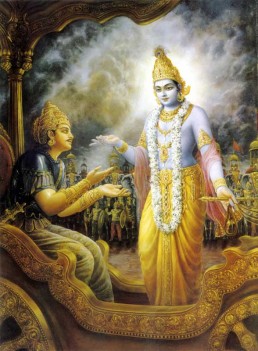Swami Chinmayananda
Swami Chinmayananda Commentary
Man is ever agitated under the influence of the triple tendencies of Unactivity (Sattwa), Activity (Rajas) and Inactivity (Tamas) inherent in him. Even for a single moment he cannot remain totally inactive. Total inactivity is the character of utterly insentient matter. Even if we are physically at rest, mentally and intellectually we are active all the time, except during the state of deep-sleep. So long as we are under the influence of these three mental tendencies (gunas), we are helplessly prompted to labour and to act.
Therefore, not to act at all is to disobey the laws of nature which shall, as we all know, bring about a cultural deterioration in ourselves. If there is a creature who remains inactive physically, he will get dissipated in his thoughts. Therefore, the Geeta advises him to act vigorously with a right attitude of mind, so that he may avoid all internal waste of energy and learn to grow in himself.
NOW, FOR HIM WHO KNOWS NOT THE SELF, IT IS NOT RIGHT TO NEGLECT THE DUTY ENJOINED ON HIM. SO THE LORD SAYS:
Adi Sankara Commentary
Hi, because; na kascit, no one; jatu, ever; tisthati, remains; api, even; for so much time as a ksanam, moment; akarma-krt, without doing work. Why? Hi, for; sarvah, all creatures; karyate karma, are made to work; verily avasah, under compulsion; gunaih, by the gunas-sattva (goodness); rajas (activity), and tamas (mental darkness); prakrti-jaih, born of Nature. The word ‘unenlightened’ has to be added to the sentence, since the men of realzation have been spoken of separately in, ‘who is not distracted by the three gunas (qualities)’ (14.23). For Karma-yoga is meant only for the unenlightened, nor for the men of Knowledge. Karma-yoga, on the other hand, is not pertinent for the men of Knowledge who, because of their not moving away from their own Self, are not shaken by the gunas. This has been explained similarly in, ‘he who has known this One as indestructible’ (2.21). But, if one who is not a knower of the self does not perform prescribed action, then this is certainly bad. Hence the Lord says:
The Bhagavad Gita with the commentary of Sri Sankaracharya – Translated by Alladi Mahadeva Sastry
Holy Geeta – Commentary by Swami Chinmayananda
The Bhagavad Gita by Eknath Easwaran – Best selling translation of the Bhagavad Gita
The Bhagavad Gita – Translation and Commentary by Swami Sivananda
Bhagavad Gita – Translation and Commentary by Bhaktivedanta Swami Prabupadha
Srimad Bhagavad Gita Chapter 3 – Verse 5 – 3.5 na hi kashchit – All Bhagavad Gita (Geeta) Verses in Sanskrit, English, Transliteration, Word Meaning, Translation, Audio, Shankara Bhashya, Adi Sankaracharya Commentary and Links to Videos by Swami Chinmayananda and others – 3-5

